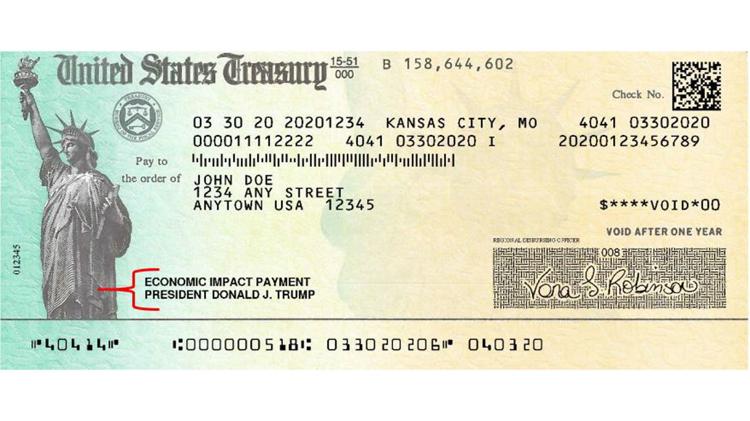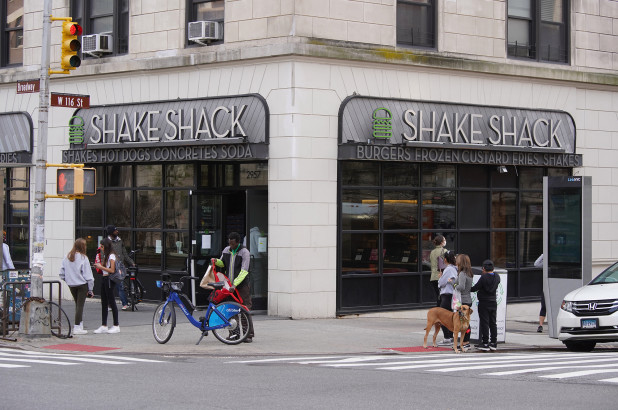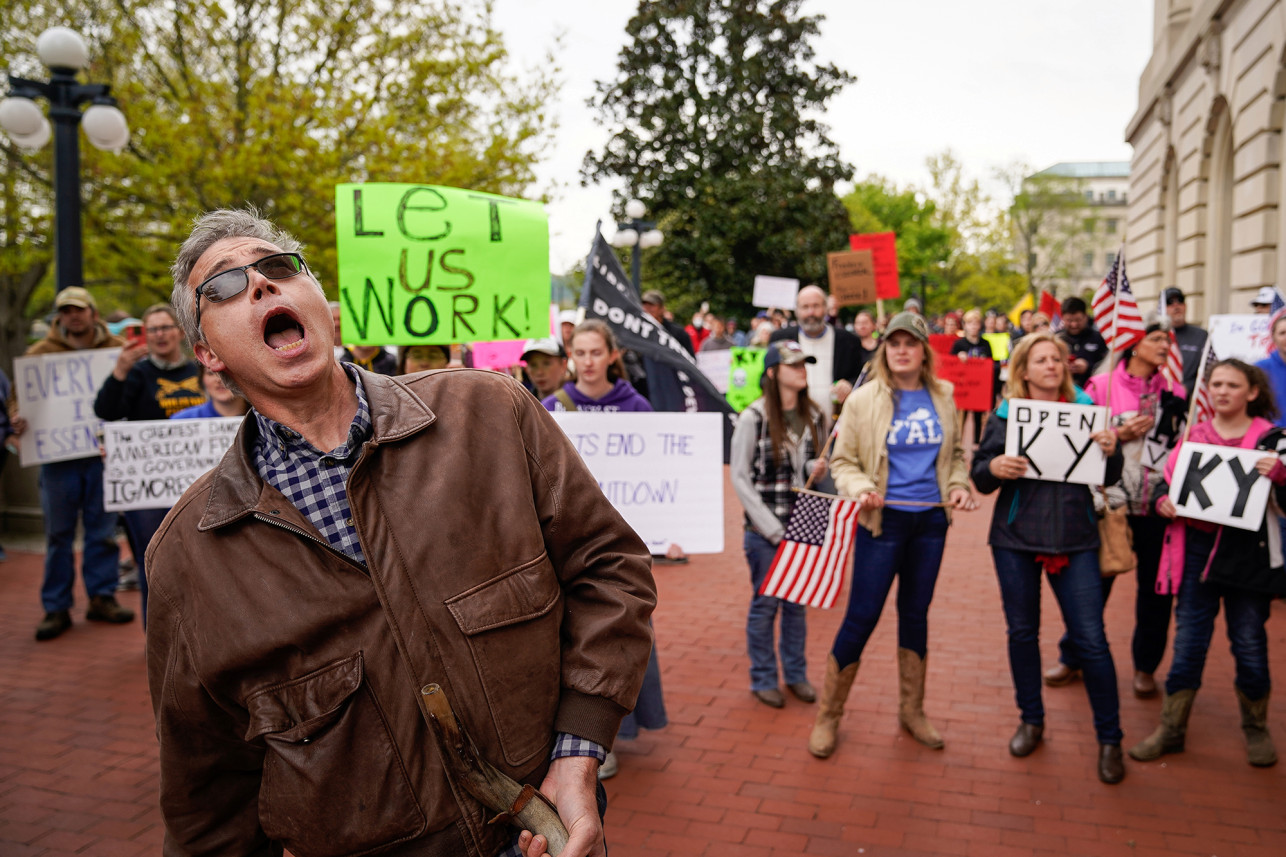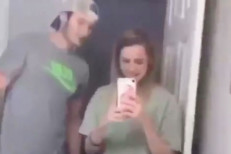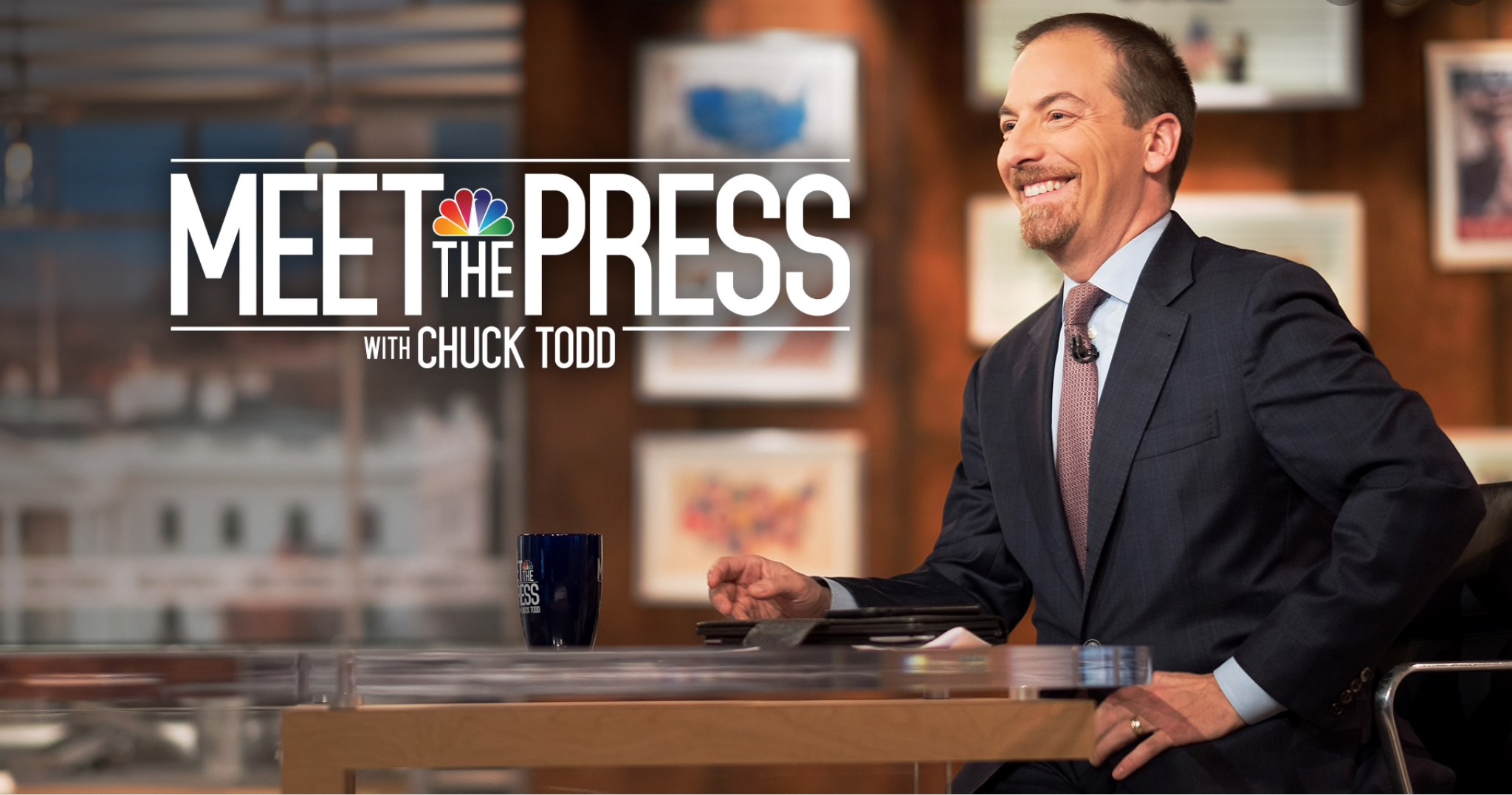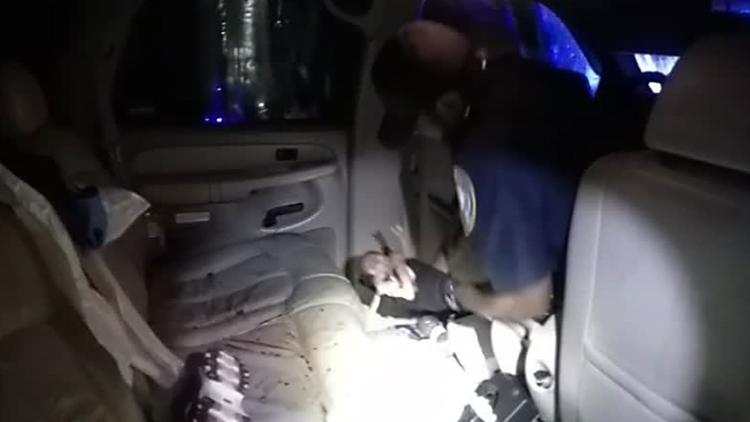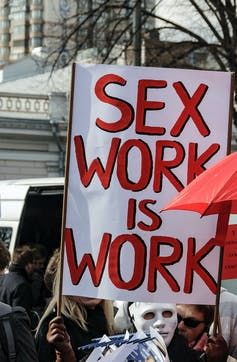Here’s what the stimulus checks with Trump’s name MAY look like
(CNN) — The federal government has published what appears to be the first official mock up of what the stimulus checks featuring President Trump’s name may look like when they’re sent to millions of homes this summer.
The checks show Trump’s name in the lower left hand corner underneath the words “economic impact payment.” The checks are signed by a Treasury Department official.
The prototype image is part of an official release press release from the US Secret Service warning people about potential scams related to the checks.
Remember: These are prototypes.
Photo Credit: kmov/US Secret Service
Shake Shack to return $10 million meant for small businesses during pandemic
Burger giant Shake Shack plans to return $10 million it received from a government loan program meant to protect small businesses during the coronavirus crisis.
The New York-based fast food chain was one of several large restaurant companies that got a multimillion-dollar loan through the Trump administration’s $349 billion Paycheck Protection Program aimed at helping struggling small firms pay workers amid the pandemic. Many merchants were left waiting for a lifeline when the program ran out of money last week.
Shake Shack decided to return its loan because it found a way to raise money through a public stock transaction instead, CEO Randy Garutti and chairman Danny Meyer said Sunday. They urged Congress to put more money into the program and prioritize businesses with limited access to outside funds.
“It’s inexcusable to leave restaurants out because no one told them to get in line by the time the funding dried up. That unfairly pits restaurants against restaurants,” Garutti and Meyer said in a LinkedIn post. “This industry rises and falls together.”
More than a dozen big publicly traded firms like Shake Shack — which has 189 US restaurants and nearly 8,000 employees — got PPP loans, even though the program was targeted at businesses with up to 500 workers, according to Bloomberg News.
Others included coal-mining company Hallador Energy, cruise operator Lindblad Expeditions and the firms behind Potbelly Sandwich Shop and Ruth’s Chris Steak House, the news agency reported Sunday.
Shake Shack decided to apply for a PPP loan because chains were eligible for funding if each location had fewer than 500 workers, Meyer and Garutti said.
Union Square Hospitality Group, Meyer’s restaurant conglomerate that helped start Shake Shack, also sought money after closing its eateries and laying off more than 2,000 people, they said.
“The ‘PPP’ came with no user manual and it was extremely confusing,” Garutti and Meyer wrote. “The best chance of keeping our teams working, off the unemployment line and hiring back our furloughed and laid off employees, would be to apply now and hope things would be clarified in time.”
House Speaker Nancy Pelosi said Sunday that Congress was “very close” to reaching a deal for more small-business loan money. Republican lawmakers have been pushing for an additional $251 billion for the program.
Photo Credit: https://nypost.com/2020/04/20/shake-shack-to-return-10-million-coronavirus-small-business-loan/
Photo Credit: Rob Kim/Getty Images
Kentucky sees highest spike in coronavirus cases after lockdown protests
Around 100 protesters gathered Wednesday on the lawn of the Capitol building in Frankfort during Democrat Beshear’s coronavirus briefing, shouting “Open up Kentucky!” and “King Beshear,” the Lexington Herald-Leader reported.
The same group returned Friday to the Capitol building, where they were met by barricades, the newspaper reported.
Instead, they circled the area in cars for a drive-through protest of Beshear’s coronavirus restrictions, the report said.
It’s unclear whether the protests had any impact on the surge of deaths reported Sunday in the state.
Beshear said at least 13 percent of cases reported in Kentucky have been nursing home residents.
Of the 273 new cases, there were 33 patients who were residents of nursing homes and eight more who were staffers, he said.
Beshear insisted Sunday he wouldn’t budge yet on easing lockdown restrictions despite the calls from protesters, according to the newspaper.
“We’re not in the 14 days of decreasing under the White House guidelines to do certain things,” Beshear said.
via: https://nypost.com/2020/04/20/kentucky-sees-highest-spike-in-coronavirus-cases-after-protests/
Photo Credit: REUTERS/Bryan Woolston
Georgia students expelled for posting ‘racist’ TikTok video
Two high school seniors in Georgia were expelled for posting a “racist” video on social media, district officials said.
The students, who were not identified by Carrollton City Schools officials, were expelled from Carrollton High School Friday for a “racially offensive” TikTok video posted Thursday that later went viral, district officials announced.
In the footage, two white students — one male, one female — use a racial slur and make vile, disparaging comments about black people while in a bathroom. The students were apparently trying to mimic a cooking show.
“Hey, today we’re making n—–s,” the female student said in the clip, which was later shared on Twitter.
“First we have black, yeah, pretty black … next we have don’t have a dad … and then we have, eat watermelon and fried chicken. Next one is, uh, make good choices. Oh, there’s nothing there.”
The students continued: “Next we have rob people, specifically whites. Yeah, they do that. The last one is go to jail.”
The behavior depicted on the video was unacceptable and not representative of the district, Carrollton City Schools Superintendent Mark Albertus said.
“The racist behavior observed in the video easily violates this standard,” Albertus said. “They are no longer students at Carrollton High School.”
The school’s principal, David Brooks, said he started investigating the video after its release late Thursday.
“It is our priority to keep our schools safe, and there is no doubt this incident has caused significant tension at Carrollton High School, across the district, state and nation – even the world,” Brooks said in a statement.
Other students at the school, meanwhile, said they were shocked after seeing the footage made by their classmates.
“I walk through the halls with those folks and to see that they think about us like that,” student Juan Nievs told WGCL. “It made me angry.”
Another teen, Terrell Carmichael, said he knows both students who produced the video.
“I was mad, like angry,” Carmichael told the station. “They would not normally talk like this, it was a complete surprise to everybody in our school.”
via: https://nypost.com/2020/04/20/georgia-students-expelled-for-posting-racist-video-on-tiktok/
Photo Credit: nypost.com
Some Landlords Are Illegally Spying On Tenants’ Stimulus Check Status
Stimulus payments, intended to help those struggling due to the economic impact of the COVID-19 pandemic, started reaching Americans last week. The Treasury Department and Internal Revenue Service (IRS) expected up to 80 million Americans to receive their payments via direct deposit by April 15, with paper checks being mailed starting next week. While millions are awaiting their payments to help with necessities, landlords are also eager for their tenants to receive stimulus checks, so they can pay rent. Unfortunately, some landlords have not just been waiting patiently; instead, some appear to be resorting to illegal tactics to learn when their tenants are receiving their payments in order to pressure them to pay.
What Are Some Landlords Allegedly Doing On IRS Get My Payments Portal?
In order to help Americans to track the status of their stimulus payments, the IRS and Treasury Department launched a new tool, Get My Payment. The tool provides individuals “with the status of your payment, including the date your payment is scheduled to be deposited into your bank account or mailed.” While the rollout of the portal has had its issues, including confusing error messages telling users, “Payment Status Not Available,” it has also helped many understand the date their payment is scheduled to be deposited into their bank account.
In order to check the status of a stimulus payment, one only needs to provide basic information, including name, date of birth, street address, and Social Security Number (SSN).

This basic information is readily available on the dark web thanks to data breaches like Equifax, where the personal information of 145 million Americans was exposed. It is also readily available to many landlords through the applications that tenants complete when applying to rent a property. While knowing someone’s payment status may not help a criminal steal funds, it could certainly help landlords. Some of them appear to be accessing this information illegally, impersonating tenants to check the status of their stimulus payments and then harassing them to pay their rent.
One Twitter user, Joshua Browder, showed an example of an alleged text exchange between a landlord and tenant, showing just how easy it is to abuse the IRS’ “Get My Payment” portal:
(Updated: According to a Facebook post, the property management company is in Forest Grove, Oregon and the tenant in the case is Austin Goodrich. Mr. Goodrich released a statement on the incident, highlighting what he calls, “the IRS’s failure to provide Americans with a secure system to check the status of stimulus payments.”)
Other uses posted photos that included similar claims.
Before gaining access to the IRS portal, users have to click through and acknowledge that use of the system is for authorized use only. The warning states, “unauthorized use of this system is prohibited and subject to criminal and civil penalties, including all penalties applicable to willful unauthorized access (UNAX) or inspection of taxpayer records.” Inputting someone else’s personal information to check the status of a stimulus payments doesn’t qualify as “authorized use,” and is illegal.
What Should You Do If Your Landlord Checks Your Stimulus Check Status?
You may want to speak with a lawyer to evaluate options if your landlord checks your payment status on the IRS portal. You may also want to consider filing a police report.
What Else Should I Know?
There is no data to contextualize how widespread this illegal tactic is. Presumably, some landlords may do this without being as brazen and admitting to it in a text thread; however, it may also be a few bad apples and not a rotten barrel. There have been many heartwarming examples of landlords who have stepped up to support their tenants during the crisis. One, Matt Salerno, forgave April’s rent for 200 – 300 tenants in his 18 rental buildings. As landlords and tenants navigate the uncertain future, they will surely need to stay in close contact; however impersonating tenants and spying on their stimulus check status should not be tolerated.
Photo Credit: forbes.com
What happens if you get the coronavirus?
The more you know The better off we’ll be STAY INFORMED .
NBC NEWS MEET THE PRESS WITH CHUCK TODD FULL EPISODE FOR APRIL 19th 2020
STAY INFORMED TISIPPERS
Georgia woman gives birth during car crash then couldn’t find the baby until later
(CNN) — A frantic trip to the emergency room became even more chaotic for a Georgia family when a mother gave birth during a car crash — and they couldn’t find the newborn when the vehicle came to a rest.
Police say a woman was behind the wheel of her SUV early Monday morning in Lilburn, Georgia, rushing her pregnant adult daughter and a one-year-old to the hospital because the daughter was in labor.
It was dark and the roads were wet. When the driver tried to make a turn, her vehicle hydroplaned across the roadway then hit a curb and power pole before slamming into a brick wall, police said.
Police body camera footage from the scene shows windows of the SUV were busted out during the impact.
Lilburn Police officers Cepeda Huff and Daniel Bride and Sgt. Matt Madden responded to the scene.
“I gave birth in the car,” one of the women is heard telling the officers in the body cam footage. The women told officers they couldn’t find the baby.
The officers began searching for the newborn, using flashlights to search the area around the SUV.
Officer Huff began searching the backseat of the SUV where the pregnant woman had been sitting. It was there he found the baby under a seat with the umbilical cord still attached.
Body cam footage shows Huff gently lifting the baby out from under the seat and rushing it to emergency medical workers.
The entire family was taken to a local hospital. The newborn was placed in a neonatal ICU and was stable.
The-CNN-Wire
Photo Credit: Lilburn Police Department
French prostitutes seeking support from government are unlikely to receive funding
In France, where prostitution is partly criminalised, it is illegal to buy sexual services but legal for a woman or a man to sell sex. And anyone selling sex must pay taxes like everyone else. But many people in prostitution – some of whom consider themselves “sex workers” and therefore believe they should be entitled to workers’ rights and protection – are not currently eligible for state income support, despite seeing their income disappear as a result of the nationwide COVID-19 lockdown.
Sex-worker organisations are now calling on the government to create an emergency fund to help the most vulnerable among their number survive the crisis. Understanding France’s current prostitution policy helps to explain why it is unlikely the state will agree.
Like many countries, France has introduced unprecedented measures to combat the spread of Covid-19: citizens are required to stay indoors and avoid social contact, and all non-essential businesses have either closed or switched to working from home. For people in prostitution, these new rules have led to a significant loss of income as sex workers and their clients isolate at home.
In 2016 a law was introduced that banned the purchase but not the sale of sexual services. The law was designed to signal the state’s belief that prostitution is a form of violence against women and contrary to human dignity.
But community health groups have criticised the law for increasing the stigma around and vulnerability of those working in prostitution. They argue that sex workers, and especially those who are particularly vulnerable, such as undocumented migrants and people struggling with substance abuse, have had to adopt increasingly unsafe working practices in order to survive. Competing for fewer clients, some of whom demand risky conditions such as unprotected sex, makes people more vulnerable. Having to hide from the police to protect their clients also exposes sex workers to increased violence.
Recently, aid organisations have highlighted the escalating insecurity experienced by sex workers unable to work because of the new confinement measures. Reports have emerged of sex workers being evicted from their homes because they cannot afford rent, and fewer vulnerable people are reaching out to community health organisations for food or medical help. It is not a problem specific to France and similar situations have been reported around the world, including the UK.
Shadow workers
In response to the COVID-19 lockdown, the state has agreed to subsidise up to 84% of employees’ wages, and has introduced a €1,500 per month grant for the self-employed. Sex workers who have the right to live and work in France and are registered as self-employed may be able to apply to these schemes.
However, anybody working illegally, in what is referred to as the “underground” or “shadow” economy, is excluded from workers’ benefits, including income support, despite being required to pay tax. In France, everybody who earns money through legal and illegal means has to pay tax. However, only those who work legally get workers’ benefits – including the new COVID-19 income support.
It’s a paradox: everybody works, everybody pays tax (in theory), but only some get workers rights and protection. In the current situation, anybody in the underground economy loses their work but get no benefits. This means that all mitigation measures introduced to help people with their income during lockdown are useless to part of the population.
The issue being raised by activist groups is that this will push vulnerable sex workers to continue working to earn money and put public health measures at risk since they cannot access income support. These organisations argue that setting up an emergency fund for people in this position would ensure that they can stay at home and self isolate without becoming destitute.
Although exact numbers are hard to determine, there are an estimated 30,000 people involved in prostitution in France, of which 93% are believed to be foreigners (documented or not), and many of whom are vulnerable and unable to draw on government support.
Community health groups and sex-worker organisations have begun fundraising to help out those most in need. They have also written to French President Emmanuel Macron for emergency funds to support sex workers during the lockdown as these organisations are unable to meet the demand for their help.
MPs have also written to the Marlène Schiappa, secretary of state for gender equality, to highlight the plight of sex workers during the crisis. All argue that state support is vital to ensuring that vulnerable people are not forced out of confinement to earn money, putting themselves and others at risk.
Prostitution policy
So far, the government has refused to provide special assistance to these sex workers. Schiappa has stated that it would be “very complicated” for the state to compensate individuals working illegally, including undeclared sex workers. Since the end of World War II, the French government considers all those working in prostitution (overwhelmingly presumed to be women) as victims of exploitation in need of rescue and rehabilitation, and only steps in to help those willing to leave prostitution.
The state supports people wishing to stop selling sex via a programme of social and financial aid delivered through accredited charities and women’s rights organisations. But recent research reveals this support package remains underfunded and unevenly applied. It has also been criticised for helping fewer than 100 people per year exit prostitution since the programme was introduced in 2017.
If the French state maintains its current policy position, it is unlikely to compensate vulnerable sex workers for lost income if they are unwilling or unable to leave prostitution. Instead it will continue to direct people towards its exit programme or charitable organisations for support. Yet policies that do not address sex workers’ welfare needs, or those of people subsisting in the “shadow” economy more generally, are likely to endanger lives and undermine the wider public health measures aimed at stemming the epidemic.
This article is republished from The Conversation under a Creative Commons license. Read the original article.
via: https://currently.att.yahoo.com/news/coronavirus-why-french-sex-workers-153556757.html
Photo Credit: currently.att.yahoo.com



